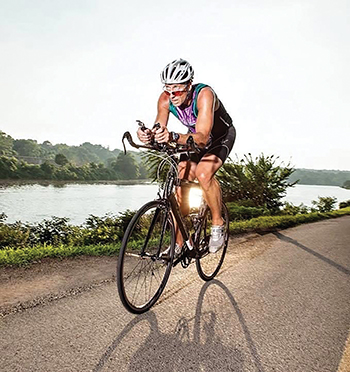Chronic Lymphocytic Leukemia Survivor
Support and progress lead to hope

After living with chronic lymphocytic leukemia (CLL) for 17 years, Stephen Brown is sure about one thing. If he doesn’t share his story of hope, he is doing a disservice to others facing CLL. He has become a staple in the CLL community and maintains a positive attitude as he continues to lead a happy and active life.
Life goes on, even after getting a CLL diagnosis. It does take a different shape every day. I’m currently nursing a hip muscle injury that is a result of being an endurance athlete. At first I wasn’t sure if it was CLL-related or just the fact I’m 63 years old, but I’ll take the fact that it’s exercise-related any day.
Difficulty swallowing was my only symptom. When bloodwork for an upcoming tonsillectomy came back abnormal and led to a CLL diagnosis, I was in disbelief. I was 45 and in excellent physical condition, having completed many Ironman competitions. The test results, however, didn’t lie. I had CLL. The choices I made from that moment on have helped me tremendously.
First, I assembled the right medical team. My wife was a visiting nurse at the time and recommended a local oncology group. The oncologist I started with is still my oncologist today, but it was a learning experience for both of us. He had never treated anyone with CLL who was as young and as fit as I was, so we looped in a CLL specialist at a large university cancer center. Every time it has been necessary to make a change in treatment, we discuss it with him. It is comforting to work with a local team that greets me by name when I walk into the office and to also know that I have a specialist from a leading cancer center in my corner. I have the best of both worlds.
Next, I made the choice to be optimistic. I’ve learned as much as I can about CLL from reputable sources, and I listen to what the doctors say. I’m a healthy eater most of the time, and I stay hydrated. I keep fit physically and emotionally, and I meditate to help manage the anxiety that comes with having a chronic blood cancer.
Along with that, I made a commitment to be vocal about my journey. I’ve connected with the CLL community and share my story through speaking engagements, writing books and volunteering. I want people to know they don’t have to handle their diagnosis in a vacuum or be afraid to ask questions. Advocacy organizations are a valuable source of support that people should take advantage of. I also encourage people to surround themselves with a core support group. My wife and daughters (and now four grandchildren) have been mine from the start.
Although everyone’s experience will be different, I talk about what has worked for me. For example, I live by four guideposts. If I feel stressed or off, one of these things is out of kilter, and I have to fix it to feel better:
- Feet. Sometimes I don’t feel grounded, so I know I need to remind myself to be present.
- Choice. Maybe I have a decision to make, or I’ve made a decision that I feel was wrong and I have to make a change.
- Chocolate. This is my emotional sweet tooth, and I always want to be feeding it. It means making sure I do something that pampers me or nurtures my soul.
- Movement. If I stay still for too long, I can get stagnant or depressed. A good workout always clears the “spaghetti” in my head.
I am fortunate that I’ve been able to work and play throughout my journey, even during active treatment. My first treatment combined a chemotherapy with a monoclonal antibody. It kept me in remission for eight years. Next I was treated with a different chemotherapy that required me to have a port put in my chest. It worked quickly to put me back in remission. When I needed to change it up again, an oral targeted therapy was available. An oral med was never an option before, and I felt like I was really on the forefront of things. After experiencing some side effects that didn’t work with my lifestyle as an endurance athlete, I tried a different oral targeted therapy that feels like the best treatment move I’ve made so far. The plan is to stay on it as long as it is effective for me.
Having to adjust the treatment plan is common with CLL, so it is good to mentally prepare for that and to know your role in it. Sometimes I noticed changes in how I felt, like it being extra hard to finish a run or getting frequent sinus infections. I stayed in close contact with my doctors about these symptoms, and we took action when it was necessary. It’s really important to keep those lines of communication open, both for things like this and for sharing good news.
If we eventually need to change my treatment plan again, I am confident there will be new options for me to try. The progress that continues to be made is encouraging. I hope you find it as hopeful as I do.


